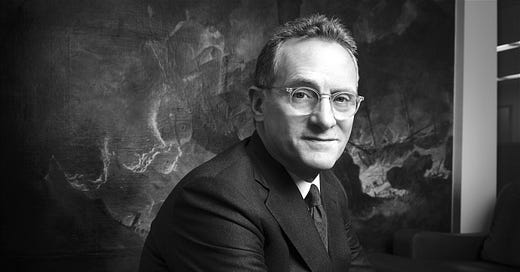Howard Marks: Investing in a time of Trump
Based on a recent Bloomberg interview, 4th April 2025
This post is based on an interview given by Howard Marks on 4th April 2025, focused on the turmoil in the markets as a consequence of Trump tariffs. Howard Marks has a wonderful ability to capture the essence of any economic moment and his sentiments were worth sharing.
Howard Marks’ Insight and Opinion
"This is the biggest change in the environment that I've seen probably in my career. You know, we’ve gone from free trade and world trade and globalization to this system, which implies significant restrictions on trade in every direction and a step toward isolation for the United States... I believe that the last 80 years since World War Two have been the best economic period in the history of mankind. And one of the major reasons was the growth of trade."
Howard Marks, Oaktree Capital
This past week delivered an economic bombshell. Markets shook. Assumptions cracked.
This moment demands more than reaction. It calls for reinvention. Investors must rethink, challenge, adapt.
When uncertainty spikes, discipline matters more. Volatility isn’t just risk - it’s a signal. Use it to find opportunity. But stay rational. Emotions are expensive.
The world isn’t ending. But the rules are changing. Fast.
For decades, one tailwind powered portfolios: globalization. Open trade. Efficient supply chains. Cheap goods.
That era is fading.
The recent ‘Liberation Day’ announcement leaves no room for doubt. It marks a seismic change in the global order. We are entering a new phase - one that is more arbitrary, protectionist, and dangerous.
We’re entering an age of fragmentation. National interests are trumping global cooperation. Tariffs are back. Onshoring is in - even if it costs more.
That shift hits everything: growth, inflation, asset prices.
This matters because trade isn’t just a political issue - it’s an economic engine. Specialization and global exchange delivered lower prices, higher productivity, broader access.
Undo that, and you pay a price.
One overlooked gift of globalization? It kept inflation low. As trade grew, goods got cheaper. That helped central banks. It helped consumers. It helped markets.
Now the tide’s turning. Less trade means more friction. Higher wages. Rising input costs. Less efficiency. All inflationary.
That breaks old assumptions.
Every investment decision now needs fresh context:
Higher structural inflation? Expect lower valuation multiples.
Rising capital costs? Rethink your discount rates.
Old models won’t cut it. This isn’t a cycle - it’s a shift. Don’t expect mean reversion. Expect regime change. Risk-adjusted discipline is non-negotiable.
In a world like this, forecasting fails. Policies, partnerships, power dynamics - they’re all in flux. That’s not a bug. It’s the new normal.
So what do you do?
Anchor to probabilities, positioning, and price. Instead of trying to predict, focus on how assets are priced relative to this new backdrop. Then ask: is that reasonable?
When uncertainty is high, discipline matters more. The best opportunities often arise when others are hesitant - but stay grounded in logic, not emotion.
And don’t confuse falling prices with rising danger. Sometimes, markets are just… ‘on sale’. The real question: am I being paid fairly for the risk I’m taking?
Despite the noise, the U.S. still stands strong. Deep markets, innovation and a rule of law which has recently shown fragility, but remains better than most.
"It's probably still the best place, but it's less best than it used to be... One of the things that made it the best place was the rule of law. That may be less the fact today. Another was the predictability of outcomes - that may be less today."
Howard Marks, Oaktree Capital
It’s been a great run. But the next decade won’t look like the last. Whether the U.S. remains the top capital destination? That’s no longer a given. It’s a judgment call.
If you liked this post, you’ll enjoy this:
Thinking like Pabrai, Marks & Buffett
In the high-stakes world of Wall Street, a peculiar phenomenon often unfolds - it’s a confusion between risk and uncertainty that savvy investors can exploit for substantial gains.








no where did marks indicate this is near a bottom...and in the past, it was only visible to those with access to oaktree actions, not his public generalities.
marks is considerably more conflicted than in the past, as part of his duties is to continuously deploy the huge sums backed by brookfield.